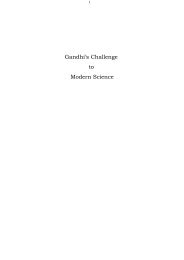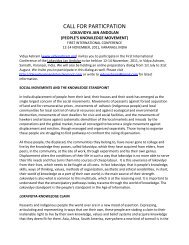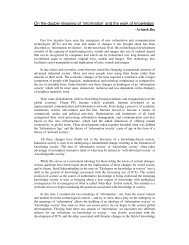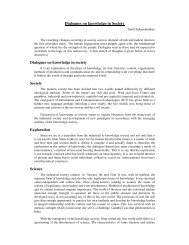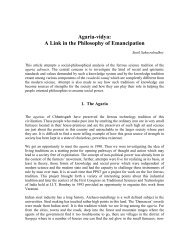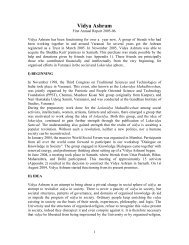1 The Information Revolution and creation of the ... - Vidya Ashram
1 The Information Revolution and creation of the ... - Vidya Ashram
1 The Information Revolution and creation of the ... - Vidya Ashram
You also want an ePaper? Increase the reach of your titles
YUMPU automatically turns print PDFs into web optimized ePapers that Google loves.
<strong>The</strong> <strong>Information</strong> <strong>Revolution</strong> <strong>and</strong> <strong>creation</strong> <strong>of</strong> <strong>the</strong> uninformed society<br />
“We, <strong>the</strong> representatives <strong>of</strong> <strong>the</strong> peoples <strong>of</strong> <strong>the</strong> world, assembled in Geneva from 10-12 December<br />
2003 for <strong>the</strong> first phase <strong>of</strong> <strong>the</strong> World Summit on <strong>the</strong> <strong>Information</strong> Society, declare our common<br />
desire <strong>and</strong> commitment to build a people-centred, inclusive <strong>and</strong> development-oriented<br />
<strong>Information</strong> Society, where everyone can create, access, utilize <strong>and</strong> share information <strong>and</strong><br />
knowledge, enabling individuals, communities <strong>and</strong> peoples to achieve <strong>the</strong>ir full potential in<br />
promoting <strong>the</strong>ir sustainable development <strong>and</strong> improving <strong>the</strong>ir quality <strong>of</strong> life, premised on <strong>the</strong><br />
purposes <strong>and</strong> principles <strong>of</strong> <strong>the</strong> Charter <strong>of</strong> <strong>the</strong> United Nations <strong>and</strong> respecting fully <strong>and</strong> upholding<br />
<strong>the</strong> Universal Declaration <strong>of</strong> Human Rights.”<br />
--from <strong>the</strong> Declaration <strong>of</strong> Principles <strong>of</strong> <strong>the</strong> World Summit on <strong>the</strong> <strong>Information</strong> Society 1 .<br />
<strong>The</strong> second half <strong>of</strong> <strong>the</strong> twentieth century <strong>and</strong> particularly its last decade has seen a dramatic<br />
increase in rhetoric heralding <strong>the</strong> dawn <strong>of</strong> a new age referred to variously as <strong>the</strong> ‘information<br />
age’, ‘information revolution, ‘knowledge society’ etc. <strong>The</strong> motive force behind <strong>the</strong> rhetoric is<br />
<strong>the</strong> emergence <strong>of</strong> new technologies broadly referred to as <strong>Information</strong> <strong>and</strong> Communications<br />
Technologies (ICTs). <strong>The</strong>se technologies are directly or indirectly transforming society on a<br />
global scale. <strong>The</strong> discourse surrounding <strong>the</strong> recent advances in <strong>the</strong> ICTs has largely been utopic<br />
<strong>and</strong> self-congratulatory, leading to visions <strong>of</strong> an egalitarian Knowledge Society.<br />
<strong>The</strong> above-cited extract from <strong>the</strong> Declaration <strong>of</strong> Principles <strong>of</strong> <strong>the</strong> WSIS is an example <strong>of</strong> such<br />
optimism. Though <strong>the</strong> declaration stresses elsewhere that, “ICTs should be regarded as tools <strong>and</strong><br />
not as an end in <strong>the</strong>mselves” <strong>and</strong> that “<strong>the</strong> benefits <strong>of</strong> <strong>the</strong> information technology revolution are<br />
today unevenly distributed between <strong>the</strong> developed <strong>and</strong> developing countries <strong>and</strong> within societies”<br />
a large proportion <strong>of</strong> <strong>the</strong> ministerial addresses <strong>and</strong> o<strong>the</strong>r proceedings from <strong>the</strong> summit share in <strong>the</strong><br />
optimism embodied in <strong>the</strong> Declaration. Amidst <strong>the</strong> banal <strong>and</strong> mostly predictable proclamations<br />
<strong>of</strong> <strong>the</strong> achievements <strong>and</strong> promises <strong>of</strong> <strong>the</strong> ICTs, cogent words <strong>of</strong> skepticism <strong>and</strong> caution came,<br />
perhaps not surprisingly, from Cuba <strong>and</strong> Zimbabwe.<br />
“<strong>The</strong>se are not times for illusions nor to echo a rhetoric meaningless to <strong>the</strong> peoples <strong>of</strong> <strong>the</strong> world.<br />
To seriously speak <strong>of</strong> “<strong>the</strong> information society”, <strong>the</strong> conquest <strong>of</strong> a world free <strong>of</strong> hunger,<br />
ignorance, unhealthiness, discrimination <strong>and</strong> exclusion is a prerequisite. For this phrase to be<br />
more than a deceitful slogan it has to be placed in <strong>the</strong> context <strong>of</strong> true humanity <strong>and</strong> solidarity”--<br />
Mr. Ricardo Alarcón de Quesada, President <strong>of</strong> <strong>the</strong> National Assembly <strong>of</strong> People’s Power <strong>of</strong> <strong>the</strong><br />
Republic <strong>of</strong> Cuba 1<br />
Zimbabwean president, Robert Mugabe was even more on <strong>the</strong> mark:<br />
“… in spite <strong>of</strong> <strong>the</strong> present global milieu <strong>of</strong> technological sophistication, we remain a modern<br />
world divided by old dichotomies <strong>and</strong> old asymmetries that make genuine calls for digital<br />
solidarity sound hollow.”<br />
“We seek equal access to information <strong>and</strong> control <strong>of</strong> communication technologies whose genesis<br />
in fact lies in <strong>the</strong> quest for global hegemony <strong>and</strong> dominance on <strong>the</strong> part <strong>of</strong> rich <strong>and</strong> powerful<br />
nations <strong>of</strong> <strong>the</strong> North. <strong>The</strong> ICTs that we seek to control <strong>and</strong> manage collectively are spin-<strong>of</strong>fs from<br />
<strong>the</strong> same industries that gave us awesome weapons that are now being used for <strong>the</strong> conquest,<br />
destruction <strong>and</strong> occupation <strong>of</strong> our nations…” 1,2<br />
Skeptical readings <strong>of</strong> <strong>the</strong> information revolution are fewer though increasing in number. In his<br />
paper on <strong>the</strong> double meaning <strong>of</strong> <strong>the</strong> word ‘information’, Avinash Jha asks, ‘does more <strong>of</strong> ICT in a<br />
1
society mean a better informed society’ <strong>and</strong> goes on to suggest good grounds for skepticism on<br />
our part that it does. Here I would like to develop on <strong>the</strong> idea that <strong>the</strong> information revolution has<br />
created <strong>the</strong> very opposite <strong>of</strong> an informed society. I consider two consequences <strong>of</strong> <strong>the</strong> revolution<br />
that lead to an uninformed society, viz, information monopolies <strong>and</strong> distancing <strong>of</strong> <strong>the</strong> consumer<br />
from <strong>the</strong> producer <strong>and</strong> end with some general comments.<br />
<strong>Information</strong> monopolies <strong>and</strong> <strong>the</strong> treatment <strong>of</strong> information as property<br />
In information <strong>the</strong>ory 3 information is defined as that which reduces uncertainty. According to a<br />
Washington Post poll conducted earlier this year seven in ten Americans were certain that<br />
Saddam Hussein was responsible for <strong>the</strong> September 11 th attacks on New York <strong>and</strong> Washington<br />
DC 4 . How does this spurious link come to be established in an information society How does<br />
this particular type <strong>of</strong> uncertainty reduction take place<br />
<strong>The</strong> use <strong>of</strong> mass communication media such as newspapers, radio <strong>and</strong> television by <strong>the</strong> State for<br />
its purposes is not new. However, in modern America we are far from <strong>the</strong> days <strong>of</strong> a single statecontrolled<br />
radio or television network. Similar results are achieved today by subtler means. <strong>The</strong><br />
work <strong>of</strong> Noam Chomsky <strong>and</strong> Edward Herman among o<strong>the</strong>rs has clearly shown how <strong>the</strong> US<br />
corporate media serves <strong>the</strong> interests <strong>of</strong> <strong>the</strong> US government by keeping <strong>the</strong> public misinformed or<br />
uninformed about foreign policy <strong>and</strong> o<strong>the</strong>r issues relating to global politics 5 . Consent among <strong>the</strong><br />
public is created not by using a single source <strong>of</strong> information but by having multiple apparent<br />
sources constrain <strong>the</strong> range <strong>of</strong> debate so as to render it meaningless.<br />
Over <strong>the</strong> past 50 years or so, <strong>the</strong>re has been a remarkable consolidation <strong>of</strong> <strong>the</strong> US corporate media<br />
such that by 1997, due to mergers <strong>and</strong> acquisitions made possibly by extensive deregulation,<br />
around 10 corporations dominated <strong>the</strong> overwhelming majority <strong>of</strong> US media. By 2000, that<br />
number had dropped to six 6 . <strong>The</strong>se six firms are Time Warner-CNN-AOL, Viacom, Disney-<br />
ABC, Bertelsmann Media Group (BMG), General Electric <strong>and</strong> Rupert Murdoch’s News Corp.<br />
<strong>The</strong>y control media content in such diverse areas as television, newspapers, movies <strong>and</strong> music. A<br />
single company, Clear Channel Communications controls over 1200 radio stations in <strong>the</strong> United<br />
States <strong>and</strong> reaches over 200 million listeners (or 70% <strong>of</strong> <strong>the</strong> population). Clear Channel controls<br />
live music in most major cities <strong>of</strong> America <strong>and</strong> artists that do not tow <strong>the</strong> line find it impossible to<br />
reach large audiences 7 . <strong>The</strong> apparent multiplicity <strong>of</strong> media forms <strong>and</strong> outlets hides <strong>the</strong> uniformity<br />
<strong>of</strong> ideology, what is more <strong>the</strong> multiplicity is critical to <strong>the</strong> propag<strong>and</strong>a machine in order that it not<br />
be viewed as carrying out propag<strong>and</strong>a. 8<br />
An important consequence <strong>of</strong> <strong>the</strong> information revolution has been that people are convinced that<br />
<strong>the</strong>y are more informed as a result <strong>of</strong> <strong>the</strong> glut <strong>of</strong> information <strong>the</strong>y are bombarded with everyday.<br />
Paradoxically, this sense has grown h<strong>and</strong>-in-h<strong>and</strong> with <strong>the</strong> consolidation <strong>of</strong> media giants <strong>and</strong> <strong>the</strong><br />
disappearance <strong>of</strong> real diversity in <strong>the</strong> sources <strong>of</strong> information. This is a direct extension <strong>of</strong><br />
consumerism <strong>of</strong> <strong>the</strong> twentieth century into <strong>the</strong> information domain. What has been called <strong>the</strong><br />
‘moreness <strong>of</strong> everything’ 9 increasingly makes its presence felt in <strong>the</strong> arena <strong>of</strong> information. <strong>The</strong><br />
result, by analogy to <strong>the</strong> supermarket shelf <strong>and</strong> its bewildering pr<strong>of</strong>usion <strong>of</strong> breakfast cereals <strong>and</strong><br />
fruit juices, is a plethora <strong>of</strong> choices all made in <strong>the</strong> same factory. <strong>The</strong> illusion <strong>of</strong> choice, <strong>the</strong><br />
illusion <strong>of</strong> being informed is compelling <strong>and</strong> I think leads directly to <strong>the</strong> rhetoric <strong>of</strong> <strong>the</strong><br />
information society. But a closer inspection <strong>of</strong> <strong>the</strong> range <strong>of</strong> choices actually available exposes<br />
<strong>the</strong>ir impoverished nature <strong>and</strong> <strong>the</strong> interests <strong>the</strong>y serve.<br />
Rapid advances in digital communication technologies in addition to being propelled by military<br />
funding (as noted by Mr. Mugabe <strong>and</strong> mentioned in note 2), are made possible by well-funded<br />
2
esearch <strong>and</strong> development divisions <strong>of</strong> corporations such as those mentioned above. Such<br />
investments in developing new technologies are borne by companies because intellectual property<br />
laws ensure huge returns on investments by <strong>the</strong> granting <strong>of</strong> comprehensive patents that ensure <strong>the</strong><br />
company’s lead in <strong>the</strong> marketplace. Just as property rights play an important role in <strong>the</strong><br />
conventional capitalist economy, with <strong>the</strong> advent <strong>of</strong> <strong>the</strong> information economy, informational<br />
property or intellectual property rights become important as incentives to innovate. It matters<br />
little that most <strong>of</strong> <strong>the</strong> innovations are trivial <strong>and</strong> cosmetic <strong>and</strong> do not make substantial advances<br />
on <strong>the</strong> initial product. Copyrights are rooted in <strong>the</strong> legitimate need for giving credit to <strong>the</strong><br />
originator <strong>of</strong> an idea (a book, a piece <strong>of</strong> music, a computer program etc). However increasingly<br />
<strong>the</strong> legislation around intellectual property rights (IPR) serves to create a scarcity <strong>of</strong> information<br />
where none need exist 10 . <strong>Information</strong> unlike material goods does not diminish in quantity when<br />
distributed. However, today laws exist to lock it up <strong>and</strong> make it inaccessible to people who desire<br />
it. <strong>The</strong> locking up <strong>of</strong> knowledge by use <strong>of</strong> intellectual property laws has well known<br />
consequences for traditional knowledge as evidenced by <strong>the</strong> neem <strong>and</strong> turmeric patent cases.<br />
With <strong>the</strong> commodification <strong>of</strong> knowledge both <strong>the</strong> products <strong>of</strong> that knowledge <strong>and</strong> <strong>the</strong> knowledge<br />
itself can be denied to <strong>the</strong> very people who are <strong>the</strong> creators <strong>of</strong> it. <strong>The</strong> copyrighting <strong>and</strong> patenting<br />
<strong>of</strong> traditional knowledge by pharmaceutical <strong>and</strong> biotechnology companies, known as bio-piracy,<br />
is a blatant from <strong>of</strong> exploitation in <strong>the</strong> new knowledge society.<br />
However, this desire to control access to information has met with resistance. One form <strong>of</strong><br />
resistance also locates itself in cyberspace through what are known as peer-to-peer (P2P)<br />
networks 11 . Two well-known examples <strong>of</strong> such networks are <strong>the</strong> music-file sharing program,<br />
Napster <strong>and</strong> <strong>the</strong> open source operating system, Linux. Both are made possible by <strong>the</strong> very<br />
developments in ICTs that raise <strong>the</strong> need for privatization <strong>of</strong> information. Napster attracted more<br />
than 10 million users in <strong>the</strong> first six months <strong>of</strong> its existence <strong>and</strong> at its peak served more than 100<br />
million users worldwide exchanging copyrighted music for free 12 . Needless to say this<br />
phenomenon presented a huge problem for <strong>the</strong> music recording industry, which has responded<br />
with <strong>the</strong> pushing through <strong>of</strong> legislation that blocks copyrighted music from being shared on <strong>the</strong><br />
Internet. Napster no longer exists in its most damaging form (it was bought over by BMG, one <strong>of</strong><br />
<strong>the</strong> six media giants mentioned before) but newer sites such as Kazaa continue to operate on <strong>the</strong><br />
fringes <strong>of</strong> legality. Linux <strong>and</strong> o<strong>the</strong>r open source s<strong>of</strong>tware on <strong>the</strong> web constitute ano<strong>the</strong>r challenge<br />
to <strong>the</strong> privatization <strong>of</strong> information. Open access to <strong>the</strong> source code that runs operating systems<br />
like Linux or any o<strong>the</strong>r s<strong>of</strong>tware application acknowledges <strong>the</strong> inherently free nature <strong>of</strong><br />
information <strong>and</strong> collaborative nature <strong>of</strong> technological advance. It opposes <strong>the</strong> monopolizing <strong>of</strong><br />
information by companies such as Micros<strong>of</strong>t. Thus P2P networks are networks <strong>of</strong> global netizens<br />
that allow s<strong>of</strong>tware developers, computer programmers <strong>and</strong> music lovers worldwide to freely<br />
share information. <strong>The</strong>y perhaps come closest to instantiating <strong>the</strong> actual promise <strong>of</strong> <strong>the</strong><br />
information revolution. Obvious limitations to this challenge also exist in that millions over <strong>the</strong><br />
globe have no access to <strong>the</strong> Internet or indeed to computers or electricity.<br />
<strong>The</strong> distancing <strong>of</strong> <strong>the</strong> consumer from <strong>the</strong> producer <strong>and</strong> transnational commodity chains<br />
Globalization powered by <strong>the</strong> engine <strong>of</strong> new <strong>Information</strong> <strong>and</strong> Communication Technologies<br />
achieves new levels <strong>of</strong> ‘distancing’. Thomas Princen defines distancing as <strong>the</strong> separation between<br />
primary resource extraction decisions <strong>and</strong> ultimate consumption decisions occurring along four<br />
dimensions- geography, culture, bargaining power <strong>and</strong> agency 13 . Of <strong>the</strong> four factors geography is<br />
most directly connected with <strong>the</strong> information revolution. Large transnational corporation can<br />
now have <strong>the</strong>ir production facilities distributed over <strong>the</strong> globe in what have been called post-<br />
Fordist production schemes. This emphasizes <strong>the</strong> transition from large, centralized <strong>and</strong><br />
hierarchical production facilities with armies <strong>of</strong> deskilled workers to smaller, decentralized<br />
3
facilities (sweatshops in Asia <strong>and</strong> maquiladores or duty-free export zones in Latin America)<br />
subcontracted from local managers <strong>and</strong> capitalists. Thus, according to Reynolds 14 …<strong>the</strong> Fordist<br />
model <strong>of</strong> production has broken down since <strong>the</strong> 1970s <strong>and</strong> is increasingly being replaced by a<br />
more flexible, post-Fordist pattern <strong>of</strong> production….<strong>The</strong> new production is based on flexible<br />
specialization <strong>and</strong> batch production in small firms that are linked through dense networks...<br />
Many studies have found that large manufacturing firms are undergoing a process <strong>of</strong> vertical<br />
disintegration whereby production is increasingly undertaken by small specialized firms linked<br />
through production contracts.<br />
<strong>The</strong> result is trans-national commodity chains. According to Ken Conca 15 , <strong>the</strong> commodity chain<br />
framework emphasizes <strong>the</strong> “technological, commercial <strong>and</strong> organizational networks that link<br />
various stages <strong>of</strong> production <strong>and</strong> exchange for a particular commodity”. <strong>The</strong> links in this chain<br />
include raw material extraction, manufacture <strong>of</strong> various components, assembly into <strong>the</strong> final<br />
product, packaging, advertising <strong>and</strong> retailing. For an increasing number <strong>of</strong> commodities <strong>the</strong>se<br />
links now occupy global proportions. Thus an American consumer gets fruit from Latin America,<br />
computers from Malaysia <strong>and</strong> shoes from Thail<strong>and</strong>. Distancing <strong>and</strong> transnational commodity<br />
chains allowed by <strong>the</strong> information revolution achieve almost complete severance <strong>of</strong> negative<br />
feedback. This means consumers are completely uninformed about <strong>the</strong> condition <strong>and</strong> means <strong>of</strong><br />
production employed in <strong>the</strong> manufacture <strong>of</strong> <strong>the</strong>ir items <strong>of</strong> daily use. <strong>The</strong> ill effects <strong>of</strong> distancing<br />
<strong>and</strong> lack <strong>of</strong> feedback are easy to see. <strong>The</strong>y follow from <strong>the</strong> fact that I am less likely to protest<br />
against what I fell is unjust if it happens half way across <strong>the</strong> globe than if it happens in my own<br />
backyard. Because it intrudes less on my consciousness I find it easy to ignore it.<br />
<strong>The</strong> Ford Motor Company once symbolized <strong>the</strong> vertically integrated, centralized production<br />
model. By 1992, components <strong>of</strong> <strong>the</strong> Ford Escort car were being made <strong>and</strong> assembled in fifteen<br />
countries across three continents 16 . Nike (<strong>the</strong> shoe company) does not own any production<br />
facilities. It relies instead on short-term contracts from a diverse array <strong>of</strong> suppliers. Its strength<br />
lies not in tightly controlled centralized manufacturing practices but in marketing <strong>of</strong> <strong>the</strong> Nike logo<br />
or image. At this juncture it should be mentioned that distancing is not a problem created by<br />
globalization <strong>and</strong> indeed has existed for many years. It does however seem to be made much<br />
worse as a result <strong>of</strong> <strong>the</strong> newer developments in information, communication <strong>and</strong> transportation<br />
technologies. Globalization propelled by advances in ICTs makes possible newer forms <strong>of</strong> cost<br />
externalization <strong>and</strong> exploitation <strong>of</strong> ‘free’ resources (both material <strong>and</strong> labor) <strong>and</strong> waste sinks.<br />
Once again consumers are ignorant or uninformed as to <strong>the</strong> social, environmental costs to <strong>the</strong>ir<br />
actions.<br />
<strong>Information</strong> revolution: Old wine in new bottle<br />
Since infrastructurally, <strong>the</strong> post-modern Knowledge Society, at least in its current form, is based<br />
solidly upon <strong>the</strong> ideas <strong>of</strong> modern science (be it solid-state physics or information <strong>the</strong>ory) <strong>and</strong> <strong>the</strong><br />
products <strong>of</strong> modern technology (be <strong>the</strong>y silicon chips or fiber-optic cables), it is likely to find<br />
itself burdened with <strong>the</strong> same inequities that characterize modern society. As has been pointed<br />
out, modern science <strong>and</strong> technology arose under pampered conditions <strong>of</strong> <strong>the</strong> colonial econmomy<br />
wherein little attention needed to be paid to designing processes <strong>and</strong> products that would be selfsustainable<br />
locally 17,18 . Hence rooted in <strong>the</strong> very soul <strong>of</strong> modern science <strong>and</strong> technology is a<br />
wasteful use <strong>of</strong> resources that ensures pr<strong>of</strong>itability/efficiency in <strong>the</strong> short run but risks rapid<br />
exhaustion <strong>of</strong> resouces with no time for adequate replenishment, in <strong>the</strong> long run. <strong>The</strong> st<strong>and</strong>ard<br />
way <strong>of</strong> making products <strong>and</strong> processes <strong>of</strong> technology cheaper is to externalize part <strong>of</strong> <strong>the</strong>ir actual<br />
cost, meaning simply not to pay for it. Of course someone or something does pay for it, but <strong>the</strong><br />
cost is hidden. One form <strong>of</strong> externalization is environmental (e.g. waste disposal by dilution in<br />
4
seas or rivers, extensive use <strong>of</strong> natural resources without adequate considersation for how to<br />
replenish <strong>the</strong>m), <strong>the</strong> o<strong>the</strong>r form is human (e.g. making use <strong>of</strong> cheap labor like indentured servants,<br />
slaves etc. dispossessing peoples <strong>of</strong> <strong>the</strong>ir l<strong>and</strong> <strong>and</strong>/or resources). Allthough all human activity<br />
externalizes to some extent, a way <strong>of</strong> life that emerges <strong>the</strong> context <strong>of</strong> massive externalization will<br />
find it difficult to shed its injustices in future, more egalitarian times.<br />
Ways <strong>of</strong> knowing <strong>and</strong> <strong>the</strong> challenge to <strong>the</strong> current order<br />
In <strong>the</strong> previous few pages I have tried elaborate on how <strong>the</strong> so-called information revolution leads<br />
to <strong>the</strong> <strong>creation</strong> <strong>of</strong> an uninformed society. In so far as <strong>the</strong> ICTs are just ano<strong>the</strong>r form <strong>of</strong><br />
communication technology (descendants <strong>of</strong> writing, printing, telegraph <strong>and</strong> telephone) <strong>the</strong>y can<br />
also be used to fight <strong>the</strong> ignorance <strong>the</strong>y create. <strong>The</strong> example <strong>of</strong> peer-to-peer networks discussed<br />
above shows that cyberspace can indeed be used in <strong>the</strong> fight against monopolies <strong>of</strong> information.<br />
Similarly, <strong>the</strong> Internet has also been increasingly used to organize protests against corporate<br />
globalization, anti-war rallies etc. <strong>The</strong> historic worldwide protests against <strong>the</strong> war on Iraq that<br />
took place in February 2003 were made possible in large part by rapid communication afforded<br />
by <strong>the</strong> Internet. <strong>The</strong> success <strong>of</strong> <strong>the</strong> World Social Forum also owes much to <strong>the</strong> ICTs. Having<br />
said that, <strong>the</strong> fact remains that <strong>the</strong> vast multitudes <strong>of</strong> <strong>the</strong> world today are information have-nots.<br />
At least in <strong>the</strong> ICT sense. <strong>The</strong>y do however possess large reserves <strong>of</strong> knowledge <strong>and</strong> wisdom<br />
arising from centuries <strong>of</strong> practice <strong>and</strong> innovation in <strong>the</strong>ir respective activities. <strong>The</strong><br />
delegetimization <strong>of</strong> <strong>the</strong>ir knowledge, <strong>the</strong>ir ways <strong>of</strong> knowing is an integral part <strong>of</strong> <strong>the</strong> project <strong>of</strong><br />
neo-colonialism made possible by <strong>the</strong> information revolution. Thus any fight against <strong>the</strong> new<br />
forms <strong>of</strong> colonialism involves taking on <strong>the</strong> information economy. Perhaps it works to our<br />
advantage that <strong>the</strong> debate is being framed in terms <strong>of</strong> <strong>the</strong> information haves <strong>and</strong> have-nots for in<br />
<strong>the</strong> end more important than both information <strong>and</strong> knowledge, is wisdom. To recall T.S.Eliot:<br />
Where is <strong>the</strong> wisdom we have lost in knowledge<br />
Where is <strong>the</strong> knowledge we have lost in information<br />
Wisdom entails holistic ways <strong>of</strong> thinking, knowing <strong>and</strong> doing wherein <strong>the</strong> collecting <strong>of</strong><br />
information <strong>and</strong> <strong>the</strong> production <strong>of</strong> knowledge is undertaken in <strong>the</strong> context <strong>of</strong> <strong>the</strong> needs <strong>and</strong><br />
considerations <strong>of</strong> all those impacted by <strong>the</strong>se activities. It implies an inclusive mode <strong>of</strong> thought<br />
that is anti<strong>the</strong>tical to exploitation <strong>of</strong> resources or <strong>of</strong> human beings. Such wisdom can come most<br />
readily from knowledge systems that are people-centered <strong>and</strong> not in <strong>the</strong> service <strong>of</strong> <strong>the</strong> inhuman<br />
notions <strong>of</strong> pr<strong>of</strong>it or <strong>the</strong> State.<br />
21 st December, 2003.<br />
* Current address:<br />
Dept <strong>of</strong> Economics, Thompson Hall,<br />
University <strong>of</strong> Massachusetts, Amherst, MA 01003<br />
Email: abasole@econs.umass.edu<br />
Amit Basole*<br />
Dept. <strong>of</strong> Neurobiology, Box 3209,<br />
Duke University Medical Center,<br />
Durham, NC 27710, USA<br />
email: basole@neuro.duke.edu<br />
5
Notes <strong>and</strong> references<br />
1. All quotes from <strong>the</strong> World Summit on <strong>the</strong> <strong>Information</strong> Society (WSIS) are taken from <strong>the</strong> <strong>of</strong>ficial<br />
website, http://www.wsis.org<br />
2. Mr. Mugabe rightly points to <strong>the</strong> fact that what is today known as <strong>the</strong> Internet, which in turn<br />
supports <strong>the</strong> World Wide Web, grew out <strong>of</strong> ARPANET, a computer communication network<br />
developed by <strong>the</strong> US Advanced Research Project Agency, for military use. As an interesting<br />
aside, <strong>the</strong> US Department <strong>of</strong> Defense vision motivated by Cold War considerations was to create a<br />
decentralized (<strong>and</strong> <strong>the</strong>refore bomb resistant) communications network. Graph <strong>the</strong>orists categorize<br />
<strong>the</strong> Internet <strong>and</strong> <strong>the</strong> world wide web as inhomogeneously wired, ‘scale-free’ networks. Such<br />
networks are characterized by a small number <strong>of</strong> highly connected nodes linking a large number <strong>of</strong><br />
sparsely connected ones. <strong>The</strong>se networks display unexpected degrees <strong>of</strong> robustness to attack since<br />
<strong>the</strong> failure <strong>of</strong> most nodes only affects a small part <strong>of</strong> <strong>the</strong> network. <strong>The</strong> flip side <strong>of</strong> this is that an<br />
attack on a key, heavily connected node can bring <strong>the</strong> network down (Albert et al,2000: Error <strong>and</strong><br />
attack tolerance <strong>of</strong> complex networks, Nature Vol 406, p378). This strategy is also used by<br />
organizations such as Al-Qaeda that operate like self-organizing, distributed, scale-free networks.<br />
3. Shannon, CE (1948) A Ma<strong>the</strong>matical <strong>The</strong>ory <strong>of</strong> Communication, Bell Systems Technical Journal,<br />
vol, 27, p 379<br />
4. Poll: 70% believe Saddam, 9-11 link, USA Today, 6 th September2003<br />
http://www.usatoday.com/news/washington/2003-09-06-poll-iraq_x.htm<br />
5. Chomsky, N <strong>and</strong> Herman ES (1988) Manufacturing Consent: <strong>The</strong> political economy <strong>of</strong> <strong>the</strong> masss<br />
media. Pan<strong>the</strong>on Books, New York.<br />
6. Bagdikian BH (2000) <strong>The</strong> Media Monopoly. Beacon Press, Boston<br />
7. Sharlet J (2003) War <strong>of</strong> <strong>the</strong> Worlds: How Clear Channel programs America. Harper’s Magazine,<br />
December 2003.<br />
8. McChesney et al eds. (1998) Capitalism <strong>and</strong> <strong>the</strong> <strong>Information</strong> Age: <strong>The</strong> Political Economy <strong>of</strong> <strong>the</strong><br />
Global Communication <strong>Revolution</strong>. Monthly Review Press, New York.<br />
9. Zengotita T (2002) <strong>The</strong> Numbing <strong>of</strong> <strong>the</strong> American Mind: Culture as anes<strong>the</strong>tic. Harper’s<br />
Magazine, April 2002.<br />
10. Perelman M (1998) ‘<strong>Information</strong> as a commodity <strong>and</strong> o<strong>the</strong>r economic metaphors’ in Class<br />
Warfare in <strong>the</strong> information age. St.Martin’s Press, New York.<br />
11. Uricchio W (2003) Cultural citizenship in <strong>the</strong> age <strong>of</strong> P2P networks.<br />
http://www.hum.ku.dk/modinet/Conference_aug/Uricchi<strong>of</strong>inal.pdf<br />
12. Giesler M <strong>and</strong> Pohlmann M (2002) <strong>The</strong> social form <strong>of</strong> Napster: Cultivating paradoxes <strong>of</strong><br />
consumer emancipation. Associaiton for Consumer Research Conference, Atlanta, Georgia.<br />
http://mali-pohlmann.com/pdfs/paradox.pdf<br />
13. Princen T (2002) ‘Distancing: Consumption <strong>and</strong> <strong>the</strong> severing <strong>of</strong> feedback’ in Confronting<br />
Consumption. MIT Press, Cambridge.<br />
14. Reynolds LT (1994) ‘Institutionalizing flexibility: A comparative analysis <strong>of</strong> Fordist <strong>and</strong> post-<br />
Fordist models <strong>of</strong> third world agro-export production’ in Commodity chains <strong>and</strong> global capitalism,<br />
Gereffi <strong>and</strong> Korzeniewicz eds, Greenwood Press, Connecticut.<br />
15. Conca K (2002) ‘Consumption <strong>and</strong> environment in a global economy’ in Confronting<br />
Consumption. MIT Press, Cambridge.<br />
16. Gereffi G et al (1994) ‘Introduction: Global commodity chains’ in Commodity chains <strong>and</strong> global<br />
capitalism, Gereffi <strong>and</strong> Korzeniewicz eds, Greenwood Press, Connecticut.<br />
17. Alvares C (1979) Homo Faber: technology <strong>and</strong> culture in India, China, <strong>and</strong> <strong>the</strong> West 1500-1972.<br />
Allied Press, Bombay.<br />
18. Sahasrabudhey S (1991) Science <strong>and</strong> Politics: Essays in G<strong>and</strong>hian Perspective. Ashish Publishing<br />
Hourse, New Delhi.<br />
19. Eliot TS (1934) <strong>The</strong> Rock: A Pageant Play. Faber <strong>and</strong> Faber Ltd., London.<br />
6




